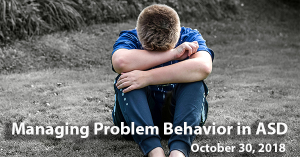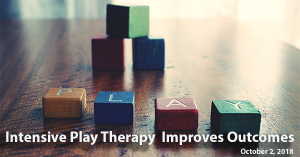Archives
October, 2018
Select a different month in the archive
What strategies work for parents of children with ASD?
By Chelsea Toledo, M.A. on October 30, 2018

Background: Autism Spectrum Disorder (ASD) often presents with behavioral issues in children that can be challenging for parents to manage. These include irritability, non-compliance, defiance, and anxiety. These issues tend to be more severe in children with ASD than in those with typical development or those with intellectual disability.
What’s New: Researchers recently conducted a meta-synthesis, combining findings from 69 qualitative studies on strategies leveraged by parents of children with ASD who demonstrated “problem behaviors.” After summarizing these findings, they organized parental strategies into nine categories:
- Accommodating the child
- Modifying the environment
- Providing structure, routine, and occupation
- Supervision and monitoring
- Managing non-compliance with everyday tasks and activities
- Responding to problem behavior
- Managing distress
- Maintaining safety
- Analyzing and planning
Their analysis revealed that parents of children with ASD had to leverage a greater number of strategies to pre-empt and address their children’s behavior than other parents. They also found that the strategies used by parents of children with ASD were more complex than those leveraged by other parents.
Why it’s important: This analysis suggests that parents of children with ASD tailor their approaches to manage specific differences in children with ASD – such as sensory sensitivities or rigidities in routine. Future research could formalize these strategies to aid parents raising children with ASD.
Help me understand :
| Source(s) : |
| Tweet |
Teens with ASD “Compensate” for Better Social Skills
By Chelsea Toledo, M.A. on October 10, 2018

Background: Autism Spectrum Disorder (ASD) is characterized by differences in communication and social behavior. Research has suggested that people with ASD experience deficits in theory of mind – the ability to attribute emotions, beliefs, intents, desires and other mental states to themselves and to others – and that these deficits underlie the social differences perceived among people with ASD. However, people with ASD vary widely in their social abilities. Are there any factor(s) that compensate for impairments in social skills?
What’s New: A recent study set out to determine patterns explaining why some young people with ASD seem to have better social skills than others. In total, 136 participants with ASD between the ages of 10 and 15 – chosen from those already enrolled in the Social Relationships Study in the UK – participated in the study, which involved a series of tasks and questionnaires.
The researchers identified two major groups of interest in this study:
- Low compensators, who had low scores on both the Autism Diagnostic Observation Schedule (ADOS) and the Theory of Mind assessment.
- High compensators, who had high scores on the ADOS in spite of low scores on the Theory of Mind assessment.
High compensators had higher IQ and better executive functioning (i.e., self-control), as compared to low compensators. High compensators also had higher levels of anxiety than their low compensating peers.
Why it’s important: This article suggests that – contrary to popular belief – people with good social skills don’t have a milder form of ASD. Rather, they are compensating with their other strengths. The impacts of this compensation, including anxiety, merit further study.
Help me understand :
| Source(s) : |
| Tweet |
Small Study Shows Promising Results for 3i Play Therapy
By Chelsea Toledo, M.A. on October 2, 2018

Background: While no standardized treatments exist for individuals diagnosed with autism spectrum disorder (ASD), treatment strategies have been devised which vary based on the type and severity of symptom presentation. Relatively few studies have assessed potential changes in outcomes among children with ASD who undergo play therapy.
What’s New: A recent study evaluated a type of play therapy called 3i, which stands for “interactive, intensive, and individual.” The researchers administered the therapy – which consisted of sensory games (Phase I), symbolic play (Phase II), and interactive play with peers (Phase III) – to 20 French children between the ages of 2 and 14 over the course of 24 months.
The researchers found:
- At the end of 24 months, participants showed significant behavioral and developmental improvement as measured by the Vineland Adaptive Behavior Scales (VABS) and Nidel Imitation Scale;
- Communication also improved among the participants, with the assessed age of communication increasing by 34%;
- Improvements in the VABS socialization score – which increased 83%, on average – occurred more dramatically among participants who had spent the most time doing the 3i regimen.
Why it’s important: This article suggests that 3i play therapy could improve developmental and behavioral outcomes in children with ASD. Future research could demonstrate which children show the most improvement using this technique, informing caregivers’ and clinicians’ decisions around therapy.
Help me understand :
| Source(s) : |
| Tweet |

